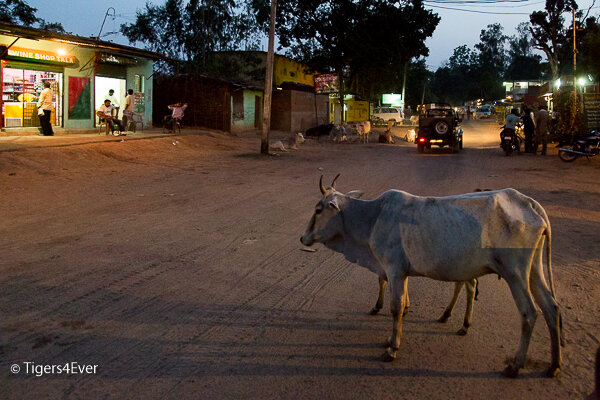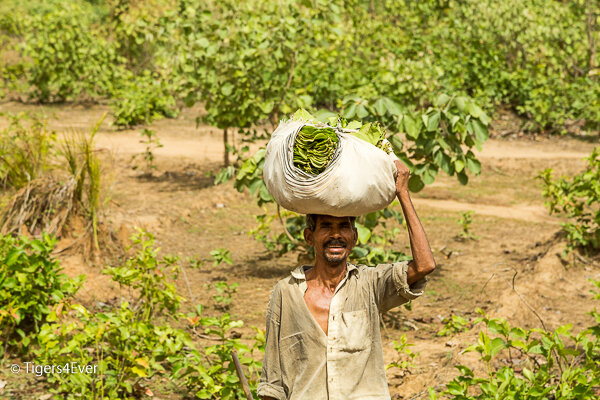By Dr. Corinne Taylor-Smith | Project Leader
Thank you for your amazing support for our efforts to give wild tigers a wild future despite the continued cost-of-living crisis! Last year we introduced our forest safety education programme into our Education projects as we tried to reduce the number of deaths and injuries due to human-wildlife conflict. We also managed to include the provision of desks and seating in a remote school and some backpacks for the children who walk miles every day to and from school whilst carrying their books and writing materials. The provision of Education packs for the poorest children living with wild tigers is still a key priority for Tigers4Ever but fundraising for education in the last 9 months has been incredibly challenging.
Forest Safety Education becomes more important every day as human encroachment into the forest increases and wildlife encroachment into the villages does too. At Tigers4Ever we have always prided ourselves on our ability to adapt to the immediate needs in Bandhavgarh and 2023-24 has certainly brought us many new challenges which have needed urgent action. These challenges include Tiger-Tiger conflict, Human-Tiger and Human-Elephant Conflict, Sloth bear attacks, forest fires, unseasonal rainfall and a lack of funds. Each challenge needs an individualised solution and we do our best to get the solutions in place as quickly as we are able. New challenges present learning opportunities for our Team both in India and the UK, emphasising just how important Education is for all.
All our projects have interdependencies as we take our unique approach to ensure that wild tigers will have a wild future because the people who live with wild tigers want to ensure that they do. Without support from the wider tiger community, our efforts to protect the wild tigers and their precious forest habitat would all be in vain. Our projects to reduce human-wildlife conflict, our anti-poaching patrols and our education projects are all vital to ensuring that wild tigers have a wild future living harmoniously alongside the people whose ancestors have been guardians of the forest in the past centuries. In 1900, 100,000 wild tigers roamed the earth living alongside 1.65 billion people with both giving the other space to thrive. Now there are only 5574 wild tigers but there are an estimated 8.1 billion humans and far less space for the wildlife to roam.
If humans and wild animals can’t live alongside each other in harmony, then the future for wild tigers is very bleak. This is why we continue to prioritise forest safety education. We need address the increases in human-wildlife conflict which threaten to undermine the successes we have had to date in boosting wild tiger numbers!
Children are the Future Tiger Protectors
We can’t forget about the thousands of children living alongside wild tigers, as we will need them to be the next generation of wild tiger protectors. Without education, these children will become dependent on the land and forest to survive, cutting down more trees to create more firewood and farmland without knowing the impact of their actions. We need to help them in 2024 and beyond, before it is too late. In the 2023, we gave educational opportunities to 820 children living alongside wild tigers and with our Forest Safety Education programme we have helped the children of more than 66 villages (so far) to be safe when encountering wildlife too. Each time our patrolling Team go to a new village they put up safety education banners and gather all the villagers to a central point whilst they deliver the safety education talk and explain how to keep themselves and wild animals safe. As I write this report, our anti-poaching patrollers are going the extra mile to ensure that safety education banners and talks reach the remaining 39 remote villages as soon as possible.
The biggest threats to life for wildlife and humans in Bandhavgarh still come from four main species: Tigers, Elephants, Snakes and Leopards. Sloth bear attacks are not infrequent, but they are rarely like the one at the end of 2023 when there were many casualties and deaths as a result of a single sloth bear’s attacks. Sadly, the world’s media only seems to focus on the killings made by wild tigers, which in turn leads to outrage and claims that the tiger is a maneater, which in the majority of cases it is not. Without education, such incidents never end well for the wild tiger as people gang up to attack it with sticks, which can lead to more human deaths or injuries! People also try to poison the tiger and its cubs, or demand that it be captured and taken to a zoo, none of which are good outcomes for the tiger or its offspring.
We Still Want to Deliver Safety Education in other areas too
Human-wildlife conflict is a growing problem in tiger territories all over India, so we hope that we can help in areas beyond Bandhavgarh, but this will require more funding and extra human resources including volunteers. We will of course need to talk to the key people in other areas to find out which animals cause the most human-wildlife conflict for them before producing tailored forest safety education resources to address their specific needs. Once we have the information to design the banners, securing funding for the production and distribution of them will be our biggest challenge! For now though, we hope to continue to reduce the loss of life for both humans and wildlife in Bandhavgarh by ensuring that everyone in the 105 villages has access to the Tigers4Ever forest safety education.
Nonetheless if elephants, leopards, snakes and wild tigers, are to have long term futures in Bandhavgarh, and elsewhere in India, it is essential that the human and wildlife communities can live together in harmony.
Traditional Educational Resources
As I mentioned above, we still want to help the poorest children living in the villages around Bandhavgarh. To this end we will continue to try to raise funds to ensure that these children can go to school and become future protectors of wild tigers rather than destroyers of their precious forest habitat. With more tigers and more elephants living in and around Bandhavgarh now, the risk of retaliatory attacks on wildlife is too high for us not to prioritise forest safety education! By ensuring the people know how to protect themselves and keep wildlife safe, we hope that such attacks and conflict will reduce.
It would be wonderful to know that you have helped us to keep thousands of wild animals safe thanks to our latest education projects, would it not?
If you wish to help us provide banners and safety education training, a donation of £14 (US$18) will help us to provide them in one village: https://goto.gg/32565
The Record so Far
We have helped 3400 children living with wild tigers in 34 villages gain access to education, so we still have some way to go. There are thousands more children who desperately need your help too! https://goto.gg/32565. We want to provide educational resources for as many villages as possible to help all the children who otherwise wouldn’t have chance to go to school. To do this, we need your help to fund many more education packs and forest safety resources. If you can help us, please donate now at: https://goto.gg/32565, where even the smallest donation can have a huge impact on the lives of these children and their families.
For every £1400 (US$1800) we raise, we aim to send 450 children living with wild tigers to school. We will distribute all education packs in the hardest hit villages and will try to raise further funds so that we can deliver safety education resources beyond Bandhavgarh. (https://goto.gg/32565).
Please help us to help more children to have an education and become tiger protectors rather than foragers, by considering a new monthly donation. It is never too late to make a difference: https://www.globalgiving.org/projects/education-saves-tigers/?show=recurring.
Long Term Impact - Help is Still Needed
Our experience has shown us over the last 13.75 years, that without education, the prospects for the poorest children will be limited to picking tendu leaves, mahua flowers and amla fruit from the forest to sell. Others will cut down trees for wood to sell and clear precious forest habitat to create more land for agriculture. Children from the poorest families don’t have access to online learning facilities, as they live without electricity or technology. https://goto.gg/32565
Your support for our work is amazing. We definitely couldn’t keep wild tigers safe without it. We hope that we can provide a brighter future for some of Bandhavgarh’s poorest children. Please help to support Bandhavgarh’s poorest rural children by starting a new monthly recurring donation from just £5 (US$8) per month, if you can, your donations will make a huge difference for at least 15 children in a year: https://www.globalgiving.org/projects/education-saves-tigers/?show=recurring.
In Bandhavgarh, for the thousands of young children with no access to schooling, without computers or mobile phones, without electricity in their homes, a bleak future awaits. These are the children who Tigers4Ever has always tried to help with books and basic writing materials to give them hope. With your help we can give them a chance which otherwise they may not have.
Your donation of £25 (US$40) can make sure that at least 5 children get educational opportunities they otherwise wouldn’t have: https://goto.gg/32565. Remember: when we provide education packs and scholarships for children living with wild tigers we reduce the risk of future tiger habitat destruction AND ensure that these children will have a chance to become tiger protectors in future.
Thank you for your generosity and support on behalf of the wild tigers, which we are keeping safe; on behalf of the children who we have helped to get an education (and their families who have food because of this help); and on behalf of the wider tiger community in Bandhavgarh, which benefits from providing books and writing materials for inclusion in the education packs which we distribute; and also the safety education training materials we are using.
Links:
Project reports on GlobalGiving are posted directly to globalgiving.org by Project Leaders as they are completed, generally every 3-4 months. To protect the integrity of these documents, GlobalGiving does not alter them; therefore you may find some language or formatting issues.
If you donate to this project or have donated to this project, you can recieve an email when this project posts a report. You can also subscribe for reports without donating.
Support this important cause by creating a personalized fundraising page.
Start a Fundraiser

